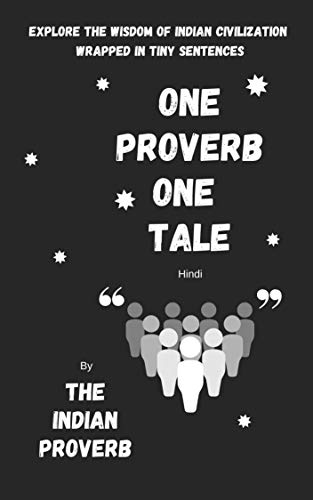1894th BLOG POST
48th
Book of 2020
I
have always been very vocal about my detachment from the genre of books which
are anthologies, collection of short stories or poems etc. Rather than being
rigid, I still ensure that I keep on picking up the books which are associated
with this genre in case I might fall in love with it one day. This made me pick
up the book named “One Proverb One Tale” written by the team running the
Instagram page named “The Indian Proverb” about which I was unaware before
picking this book. The cover page also has the tagline that says “Explore the
wisdom of Indian civilization wrapped in tiny sentences”.
This
book has 44 proverbs written in Hindi from our ancient civilization. To explain
it better, author has also shared a small tale for each of them for us to
comprehend and understand the meaning behind the same. Along with the Hindi
text, author has also ensured to provide a translation for the same in English
which made it little more helpful for me to proceed ahead with reading the
small tales. All the stories sound simple but speaks big volume. There are some
of them which makes you think about your approach and tendency towards others
and your work. Author has narrated all the tales simply as a story but gives
strong messages without being preachy. This is what makes these stories
interesting.
The
language used for writing the tales and stories are very simple. The editing is
perfect as author could have stretched these short tales but it has been beautifully
ensured that it gets completed within 1-2 pages itself. There is consistency in
all the stories as they are written in one template itself as if author is
describing someone else’s story and making them realize where they went wrong
or remained unaware. Generally, authors tend to write as a first voice or third
voice in different stories but here, such unwanted trials are not made.
Now,
talking about few stories which shall always stay with me:
“Overthinking”
is a nice chapter speaking on how we stay hesitant of doing something and
committing mistake or else we end up only thinking without doing anything.
"The Loss" speaks on how we end up losing what we own for
something which we have only lusted upon.
"The Present-Past" is about our behaviour these days where
we never enjoy what we are currently doing rather keep thinking of the next
task in hand.
In "The Soldier", author talks about how we never look at a
soldier with any kind of identity but only as a soldier who safeguards our
nation.
How our worrying doesn’t have any medicine even with the doctors is nicely
portrayed in "The Worry" where author tries to deliver the message of
how we are getting unhealthy due to unnecessary worries.
“The Suspicion” chapter shows the humorous side of the author which
came as a surprise in between.
"The Curse" is a very good take on karma and receiving
kindness in return of giving kindness.
"The Noise" is so apt as per today's era where a person keeps
boasting about himself and we get into inferiority complex but we later realize
that the truth is different and we are better in many terms than the person.
"The Controllable" talks about the biggest lesson Bhagavad
Gita gives- "Karam Karo, Fal ki chinta mat karo".
"The End" is the last chapter which tells the significance
of Death and how it brings humility in a human being after realizing that
everything could have ended in one moment itself.
Now, talking about the drawbacks, I couldn’t find any except that
there are some typos and grammatical errors in the book.
Overall, this is a very unique concept which I have seen for the 1st
time in last decade. This is a great light-read to which I am rating 4.5 stars
out of 5.
Thanks.
WRITING BUDDHA




0 CoMMenTs !!! - U CaN aLSo CoMMenT !!!:
Post a Comment